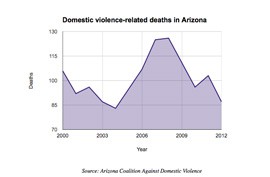Cronkite News has moved to a new home at cronkitenews.azpbs.org. Use this site to search archives from 2011 to May 2015. You can search the new site for current stories.
Stanton: Training, collaboration key to fight against domestic violence
PHOENIX – Collaboration and streamlined protocols for dealing with domestic violence are helping the city of Phoenix use limited resources more effectively, Mayor Greg Stanton said Thursday.
“In the past we probably weren’t as trained as we should have been,” Stanton said. “Now all our officers are fully trained to get the victim away from the abuser right away and then begin the whole prosecutorial system.”
Stanton made the comments after joining other area leaders at the City of Phoenix Family Advocacy Center for a news conference marking Domestic Violence Awareness Month.
He said the Phoenix Police Department receives about 42,000 domestic violence calls a year and generates 12,000 reports.
“The volume of these reports is overwhelming, and limited resources make it impossible to adequately respond to every single one,” Stanton said. “There has to be a better way, a more collaborative way to approach the issue.”
Avondale Mayor Marie Lopez Rogers said a project by the Maricopa Association of Governments is reworking how the criminal justice system handles domestic violence cases.
“We are all searching for more effective ways to reduce the trauma and cost associated with domestic violence,” she said. “This project provides that solution.”
Phoenix updated its protocol for police officers dealing with domestic violence cases. Stanton said officers responding to calls now look for controlling behaviors and patterns of violence in addition to signs of physical abuse.
“These indicators allow resources to be focused on the cases most likely to end up in more serious incidents of violence, even homicide,” he said.
More effective law enforcement techniques give prosecutors a better chance of moving these cases quickly and effectively through the courts, Stanton said.
“The city of Phoenix’s protocols are positively impacting how quickly domestic violence cases are prosecuted,” he said. “Improved investigative techniques provide important details prosecutors need to move cases in a timelier manner.”
MAG, in collaboration with the O’Connor House, also released an interactive Web map showing locations of advocates who help crime victims.
Lucia Howard, co-chair of the AVON Program for Women and Justice at the O’Connor House, said the effort also is addressing the fact that many of the advocates go into the field with no training.
“Victims can’t stand alone and be expected to face attorneys and cross examinations and depositions to bring abusers to justice,” Howard said. “They need help. That’s one of the important roles that victim advocates can help in, if they are properly trained in the judicial system.”
Stanton said while MAG and the city of Phoenix are making progress, limited resources have been a challenge. For example, he said, cuts in state funding have meant fewer beds at shelters for domestic abuse victims.
“It’s so important that we give women the support system necessary to … have the courage to prosecute their abusers,” Stanton said. “And we’re not there yet.”









